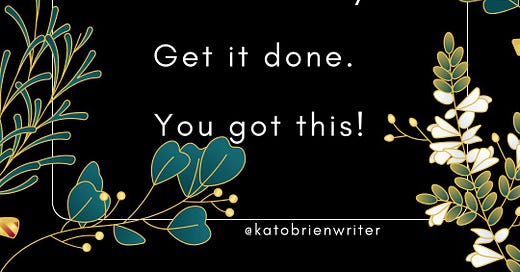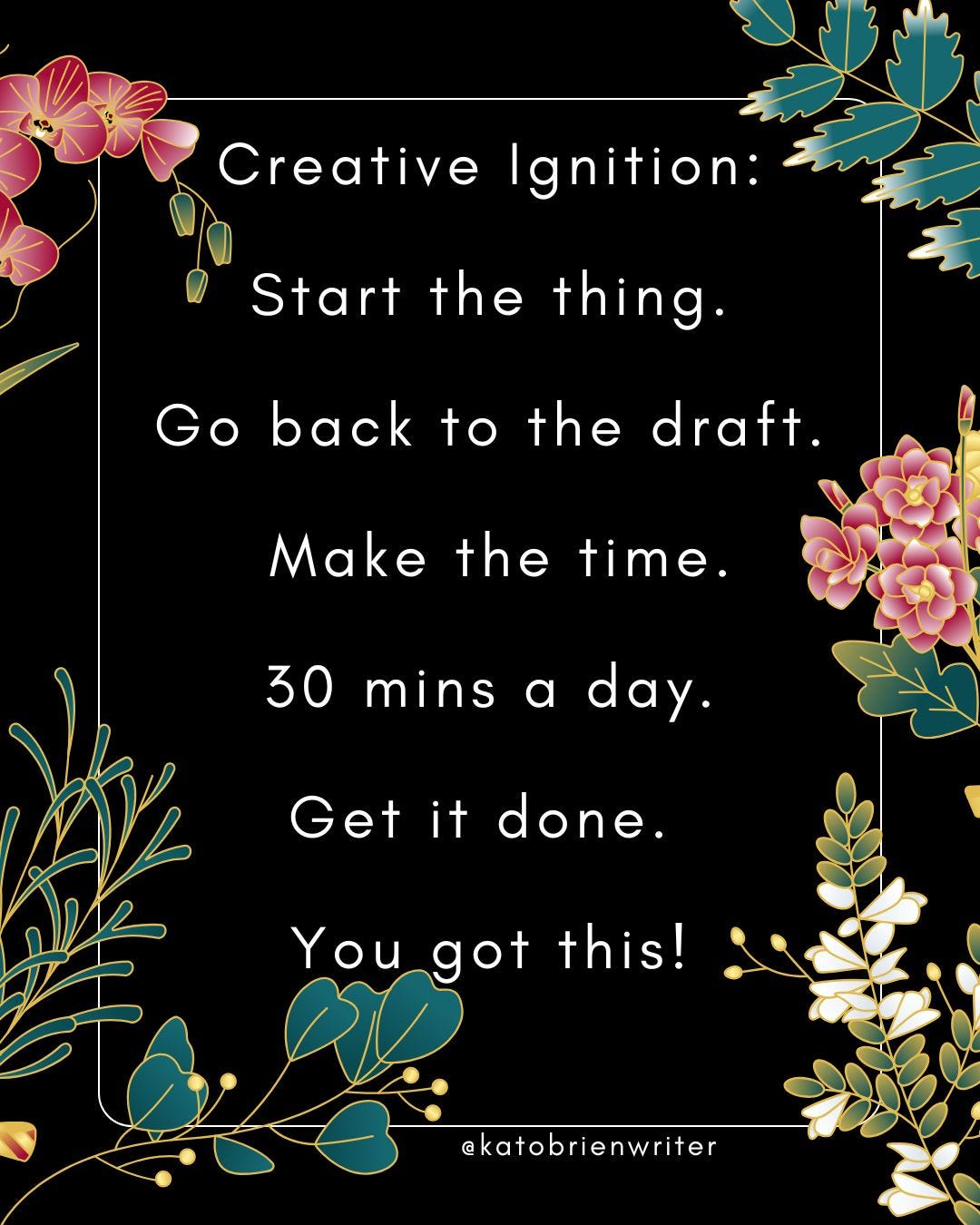Part of the fun of this Substack - for me and you both - is that I’m improvising here. I’ve done a decent amount of research, reading about the conventional wisdom and best practices for if-when-how to Substack. Noted. Some of it. And the rest I’m just like— I feel like if I don’t start now I don’t know if and when I ever will.
Have you ever found yourself delaying the start of a creative project, or new business initiative, or even just like, that 30-day wall pilates challenge? Even when something sparks our curiosity, something immediately appeals to us, we still sometimes override our impulse to start because… because, because, because. Always a million reasons why NOT to do something, now, at all, if ever.
In my experience, finding the courage to start over and begin again has something to do with understanding our relationship to our unique and evolving creative ignition. I’ll unpack what I mean by that in a sec.
First, sidebar: I want you to think about the first time you felt that “spark” of attraction or interest in a particular activity, maybe arts, maybe sports, maybe something academic, maybe it became a hobby, or maybe it became your passion, or your job. A time when you experienced something new and you were like— YES.
And then, there have been other times no doubt when you had that YES moment but it didn’t last. Maybe the appeal faded too fast. For whatever reasons. I think we get into this state of trying to start and restart, again and again, because we’re here, we showed up, we said we’d do the thing or for some other reason we feel like we’re supposed to be doing the thing and, click, click, click —you’ve got a flooded engine.
The damned thing won’t start.
(This flooded engine idea is literally giving me low-key trauma flashbacks to learning how to drive stick BUT. ALSO. It’s the pressure to perform, usually at a certain expectation of … functionality, mastery, dare I drop the P word *perfection*?)
Not always, not exactly, but somewhere in that high-performance ballpark.
Sound familiar?
Fear and doubt can show up (expectedly, and unexpectedly) in the creative process. And this can feel especially confounding for those of us that feel pretty confident, capable, or maybe even a little fearless in other aspects of our lives. It’s normal. It’s pretty common. Actually, I see it in a lot of folks (myself included) both personally and academically/professionally.
Even for those of us that are comfortable with failure and admitting mistakes (bravo!) it’s almost like, somewhere along the way, we forgot that it was totally okay to admit that we don’t know what we’re doing, even if we think we “should” (for whatever reasons). We want to be seen and heard and told that we’re not wasting our time.
(I get that a lot from clients and students. It’s total BS. You’re not wasting your time if you’re finding joy, having fun, and learning something! No, we’re not all going to be Heisman-winning QBs in the NFL, but one or two of them may or may not have once wondered aloud if they were wasting their time playing football. BA-NA-NA-S. You see where I’m going with this?)
Imposter syndrome is the worst. As the venerable Nina Foch once disclosed to me when she was my professor back in college, “We all feel like frauds sometimes—” and I really wish I could remember what she said after that, but I think it was maybe a tangent about the prevalence of abortions in Hollywood in the 1970s, so probably not-so-critical to making my point.
Some of us want to be told we’re good at the thing. And all of that “finished draft” pressure to perform makes it damn near impossible to start writing “the shitty draft”, to go back to the long road of the work in progress and buckle in to keep going.
(And writing is totally a metaphor for All The Things, here.)
You know what creative ignition is. If you’re reading this post, you’ve likely felt it.
It’s when that spark of desire lights the flame that fuels your motivation to follow through on whatever it is you’re creating once you begin. Sometimes, everything clicks and the creative process runs smoothly.
Most times, though, it doesn’t. But because we’ve had those experiences when it’s all a dream— that’s like the gambler’s high that keeps us coming back to the table— I think a lot of us have (unreasonable?) expectations that every time we sit down to do the thing… that it should go as smoothly as it always has. Especially when we’re seasoned pros, been doing our thing for years and years, maybe even multiple decades.
But any sports fan can recall how even the GOATs have their off-nights. Any golfer knows that the devil’s in the details of being consistent, and yet the game challenges your consistency on every hole, with every shot. That’s the point of golf. (Right?)
And yet for some reason, when it comes to creativity — our thinking, our problem solving, our writing, our art, whatever it is we’re making, building, doing — we expect that our 10,000 hours of consistent practice and dedication to the mastery of whatever creative endeavor we pursue should make it, somehow… easy.
Maybe this mindset follows us even to the adjacent creative practices that we pursue. The related arts, crafts, endeavors. (I’m looking at you, crossover writers, athletes that “just pick up” golf, corporate success stories launching solo practices...)
And I think part of it is because sometimes we do try something creatively new to us and it clicks and we’re maybe a little surprised but it’s also encouraging and thrilling.
When something creative unexpectedly clicks, it can trick us into expecting that ease and flow from ourselves every time we sit down to create. There’s something about our hard-won lived experience, maybe even expertise, that tells us: we should be able to do this better. Especially if it’s something where our skills and experience “should translate”.
Despite my publicly oft-stated dedication to “writing the shitty draft” and “just commit and go with it” advice to literally everyone including myself, if I’m really being honest, I do still kinda expect to summon the flow every time I sit down to write, regardless of draft status, regardless of medium. Less so now that I’ve become more aware of this ego-driven absurdity, and less so especially because I want to practice what I preach. But it’s undeniably there, like this mischievous, little elfin part of me that’s like— you know you got the magic…
But that’s just it! The magic isn’t your expertise or all the hours you’ve put in to honing your craft and professionally expert approach to doing whatever it is you do. Your magic is your mindset, and your ability to recognize that you’re still, forever and always, a beautiful Work-In-Progress.
Understanding the role that our creative ignition plays in keeping us humble to the creative process, open to play, open to failing and being bad at something, cracks us open to make discoveries that take us beyond what we think we know. This ability to continue to discover is essential to our creative evolution.
(Also it’s pretty key to a happy partnership. Writing advice and relationship advice always go hand in hand with me, you’ll see.)
When you’ve been at something for awhile, by whatever definition you deem successfully so— it’s easy to feel stagnant, to plateau, or for the process to feel a little routine, rote, or uninspired. In talking to my friends, colleagues, students, and clients— I think that happens to lot of us in work/life.
By understanding how your unique brand of creative ignition operates in your creative process, you can leverage it to discover ways to get yourself unstuck, to grow, to delight yourself, to surprise your collaborators, to unblock and unlock your own and their potential to find news ways to approach the same old everything.
The novelty and thrill can become a positive-reinforcement feedback loop that then sustains our finding way to continually move beyond, to grow, and to evolve.
For some of us, depending on our career — this can be an empowering way to make our art (more) relevant (again), at any age. For others, it’s about the rebrand, or the (repeated) relaunch of a new endeavor, project, product — to similar ends.
There’s something magnetic about making discoveries that connects us more deeply to ourselves, to our teams and partners, and ultimately, to those whom we most want to impact and reach with our efforts. And connecting to your creative ignition is so key to finding the courage to take the creative risk required to start over.
Or just to start something new. And keep it going.





